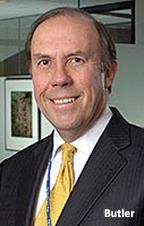Soon off to war for APTS: new president, Pat Butler
 Patrick Butler, public TV’s new chief lobbyist, wrote speeches for President Gerald Ford, was a founder of the Pew Research Center, and helped provide Ken Burns with funding for his acclaimed Civil War documentary series.
Patrick Butler, public TV’s new chief lobbyist, wrote speeches for President Gerald Ford, was a founder of the Pew Research Center, and helped provide Ken Burns with funding for his acclaimed Civil War documentary series.
Butler starts work as president of the Association of Public Television Stations Jan. 1 [2011].
The APTS leader has represented major media firms in Washington — the Washington Post Co. for 18 years, and before that Times Mirror Co. and RCA.
He’s also been a member of the APTS Board since 2009 and chair of the MPT Foundation, which raises private funds to supplement state support of the state-owned Maryland Public Television network.
Butler has “amazing connections” in both parties, testifies Rob Shuman, president of MPT and a friend of Butler’s for 35 years.
The APTS Board unanimously approved Butler’s appointment as the association’s president Nov. 7 during its retreat in Alexandria, Va.
Over the past two-and-a-half years, APTS has had an elected president less than half of the time. For 17 of the past 31 months, the association was searching for a president — 10 months to hire Larry Sidman, a past attorney for APTS, and seven months to appoint Butler, a member of the APTS Board. Sidman held the office for about 14 months before resigning (Current, March 14, 2010).
Butler retired as senior v.p. of the Washington Post Co. in December 2008; he had been responsible for public policy, business development, community service and special projects. Among his ventures with the company, he founded and headed Newsweek Productions, producer of the 2003 Emmy-winning PBS documentary Watergate Plus Thirty: Shadow of History.
Three decades earlier, during the impeachment of President Nixon, Butler had been a top staffer for House Judiciary Committee member Lawrence Hogan (Md.), a Republican who called for impeachment.
Butler remains a consultant to the Post Co. and runs his own firm, Butler Consulting Inc., Bethesda, Md.
Butler’s D.C. experience is longtime, diverse and deep, according to a biography. In addition to his work as a speechwriter for President Ford, he also spent nearly a decade as an aide to Howard H. Baker Jr., a moderate Republican senator from his home state, serving as special assistant to the senator when he was the Republican leader and as a consultant when Baker was President Reagan’s chief of staff.
In April 1988 Reagan nominated Butler to the National Council on the Humanities. He chaired the council’s Public Programs Committee, which recommends National Endowment for the Humanities funding for projects including public television and radio documentaries. Butler backed support for Burns’ Civil War series, which ran on PBS in 1990.
Shuman said Butler played an important role on behalf of MPT’s highly regarded ThinkPort online education platform, a partnership between MPT and Johns Hopkins University Center for Technology in Education Maryland that gives teachers and parents tools for interactive lesson plans.
For MPT to excel in educational outreach, “we had to have champions, people outside the station,” Shuman said. Through Butler’s wide network, he introduced Shuman not only to Congressional powerbrokers but also to business leaders such as Lockheed chief executive Norm Augustine. The connection led to “huge support,” Shuman said, from both Lockheed and Northrop Grumman for the station’s STEM (science, technology, engineering and math) projects.
Foundation work is another Butler forte. Shuman recently approached Butler about the Bill and Melinda Gates Foundation. “Within weeks, we had a meeting,” Shuman said.
Butler sits on several boards, including as v.p. of the Foundation for the National Archives.
“The doors that Pat has opened for us, his passion for outreach, his understanding that it’s not just the primetime broadcast that attracts supporters but a broad range of community services — all that makes him so valuable to public broadcasting,” he added.
He is also chair of the Dean’s Advisory Council of the American University School of Communication. Butler began his career as a newspaper reporter in Chattanooga, Tenn.
He is a founder of the Pew Research Center, originally known as the Times Mirror Center for the People & the Press.
Despite Butler’s many achievements, “he’s probably the most humble guy I know,” Shuman said. “He’s not going to be the one who jumps up to speak first, or to drop names.”
“I can’t tell you how good I feel about this choice,” he added. “I know that we’ll miss Pat and his leadership and connections, but I also know he’ll always be there for us. The contribution he’s making to public TV, to serve all our stations, will be an enormous asset.”
Shuman quipped that “the system owes me one — and I say that proudly.”
The APTS presidential search committee was co-chaired by Polly Anderson, g.m. of KNME-TV, Albuquerque, New Mexico; and Elizabeth Christopherson, president of the Rita Allen Foundation, Princeton, N.J. Members were APTS Board Chairman Rod Bates, g.m., Nebraska Educational Telecommunication; DeAnne Hamilton, g.m. of WKAR, East Lansing, Mich.; John Harris III, president of Prairie Public Television, Fargo, N.D.; Skip Hinton, NETA president; Tom Karlo, g.m. of KPBS, San Diego; and Lonna Thompson, APTS acting president.
Web page posted Nov. 17, 2010
Copyright 2010 by Current LLC